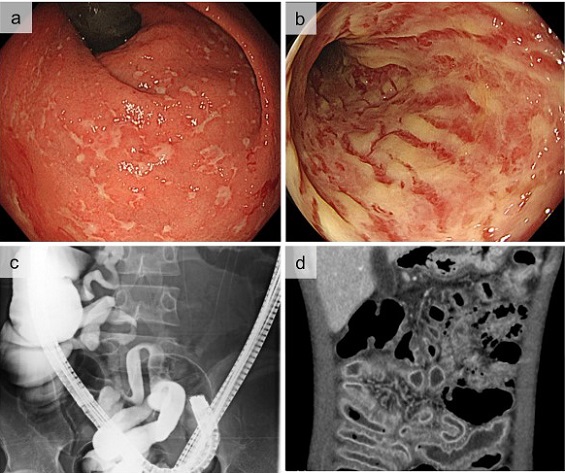Japanese Doctors Warn That COVID-19 Can Cause Severe Enteritis Which Can Be Treated With Cyclophosphamide
Nikhil Prasad Fact checked by:Thailand Medical News Team May 11, 2024 1 year, 9 months, 3 days, 5 hours, 39 minutes ago
COVID-19 News: Enteritis, characterized by inflammation of the small intestine, can stem from various sources. Contaminated food or drink, autoimmune conditions like Crohn's disease, certain drugs including NSAIDs and cocaine, radiation therapy, celiac disease, tropical sprue, and Whipple disease are common triggers for this condition. The inflammation and swelling that occur in enteritis can lead to a range of symptoms, from mild discomfort to severe complications.
 COVID-19 Can Cause Severe Enteritis Which Can Be Treated With Cyclophosphamide. (a) Ileocolonoscopy demonstrated diffuse mucosal inflammation extending from the lower rectum to the cecum. (b) Ileoscolonoscopy demonstrated loss of structure in most of the villi in the terminal ileum. (c) A loss of Kerckring folds and small intestine stiffness were observed using a contrast agent through an endoscope. (d) CT demonstrated thickening of the small and large intestinal walls with submucosal edema.
The Case Study: Severe Enteritis Associated with COVID-19
COVID-19 Can Cause Severe Enteritis Which Can Be Treated With Cyclophosphamide. (a) Ileocolonoscopy demonstrated diffuse mucosal inflammation extending from the lower rectum to the cecum. (b) Ileoscolonoscopy demonstrated loss of structure in most of the villi in the terminal ileum. (c) A loss of Kerckring folds and small intestine stiffness were observed using a contrast agent through an endoscope. (d) CT demonstrated thickening of the small and large intestinal walls with submucosal edema.
The Case Study: Severe Enteritis Associated with COVID-19
Recently, doctors at Osaka Metropolitan University in Japan reported a unique case of severe enteritis associated with COVID-19 that is covered in this
COVID-19 News report.
An 18-year-old man with a history of ulcerative colitis presented with debilitating symptoms including severe diarrhea, protein-losing gastroenteropathy, and hypoalbuminemia. Initial treatments with steroid pulse therapy, adalimumab, and infliximab proved ineffective, leading to a critical state of hypovolemic shock. Upon further investigation, the patient's enteritis was found to be linked to SARS-CoV-2, the virus responsible for COVID-19.
Immunostaining as a Diagnostic Tool
In diagnosing COVID-19-related enteritis, immunostaining has emerged as a valuable tool, especially in cases where serology tests for COVID-19 yield negative results. In this particular case, immunohistochemical analysis using antibodies against angiotensin-converting enzyme 2 (ACE2) and SARS-CoV-2 spike protein confirmed the presence of the virus in the small intestinal mucosa, highlighting the association between COVID-19 and enteritis.
Cyclophosphamide as a Promising Treatment
Given the severity of the patient's condition and the failure of conventional treatments, the doctors turned to cyclophosphamide pulse therapy as a last resort. Cyclophosphamide, known for its role in chemotherapy and immune suppression, has shown efficacy in treating life-threatening autoimmune diseases where other medications have fallen short.
Understanding Cyclophosphamide
Cyclophosphamide, also known as cytophosphane, is a versatile medication used in chemotherapy to treat various cancers including lymphoma, multiple myeloma, leukemia, ovarian cancer, breast cancer, small cell lung cancer, neuroblastom
a, and sarcoma. Additionally, it serves as an immune suppressor, finding utility in conditions like nephrotic syndrome, granulomatosis with polyangiitis, and post-organ transplant management.
Benefits and Considerations of Cyclophosphamide
While cyclophosphamide has demonstrated efficacy, it is not without its side effects. Common side effects include low white blood cell counts, loss of appetite, vomiting, hair loss, and bladder bleeding. Severe side effects such as an increased risk of future cancer, infertility, allergic reactions, and pulmonary fibrosis are also possible. Due to these risks, its use is often reserved for severe cases where other treatments have failed.
Role in Autoimmune Diseases
Cyclophosphamide plays a crucial role in managing severe autoimmune diseases like systemic lupus erythematosus with severe lupus nephritis, minimal change disease, severe rheumatoid arthritis, granulomatosis with polyangiitis, Goodpasture syndrome, and multiple sclerosis. However, its potential side effects, particularly related to reproductive health, necessitate careful consideration and monitoring during treatment.
Conclusion: A New Hope for Severe Enteritis Caused by SARS-CoV-2
The case study from Osaka Metropolitan University underscores the potential of cyclophosphamide in treating severe enteritis associated with COVID-19. While more research and clinical trials are needed to validate its efficacy and safety in this context, this breakthrough offers hope for patients facing life-threatening complications from enteritis, especially when conventional treatments prove ineffective. Healthcare providers worldwide can learn from this case and consider cyclophosphamide as a viable treatment option in similar challenging scenarios.
The case study and recommendations were published in the peer reviewed Journal of Gastroenterology and Hepatology.
https://onlinelibrary.wiley.com/doi/10.1111/jgh.16605
For the latest
COVID-19 News, keep on logging to Thailand Medical News.
